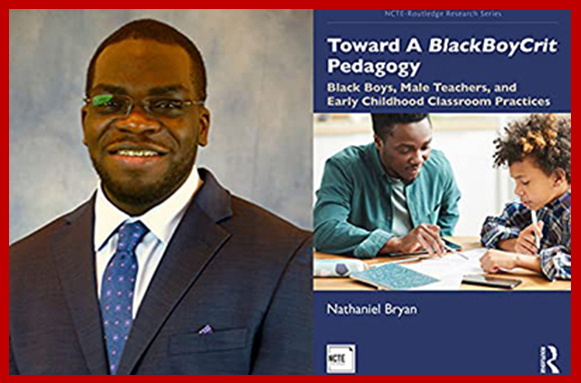
New book examines how to better support Black boys in a broken educational system
Miami’s Nathaniel Bryan addresses the impact of socially constructed stereotypes and perceptions in the classroom
By James Loy, Education, Health and Society
 Commonly cited statistics about Black male students — high dropout rates, low test scores, low graduation rates — obscure the problems of an educational system that fails to understand and meet the academic and social needs of Black boys in the student body, according to a new book by Nathaniel Bryan, an assistant professor of early childhood education at Miami University. His new book, Toward a BlackBoyCrit Pedagogy: Black Boys, Male Teachers, and Early Childhood Classroom Practices, explores the teaching practices that can better support Black boys, while also examining the consequences of the existing educational system in the United States.
Commonly cited statistics about Black male students — high dropout rates, low test scores, low graduation rates — obscure the problems of an educational system that fails to understand and meet the academic and social needs of Black boys in the student body, according to a new book by Nathaniel Bryan, an assistant professor of early childhood education at Miami University. His new book, Toward a BlackBoyCrit Pedagogy: Black Boys, Male Teachers, and Early Childhood Classroom Practices, explores the teaching practices that can better support Black boys, while also examining the consequences of the existing educational system in the United States.
“Curriculum is built on the experiences of white children, [and] schools are culturally relevant and responsive to the academic and social needs of white children. And the ways in which teachers teach are often informed by white cultural ways of knowing and being,” Bryan said. “For that reason, it's important that teachers are prepared to teach in culturally relevant and responsive and sustaining ways to better support the academic outcomes of Black boys.”
Bryan studies the constructed identities and teaching styles of Black male teachers and the schooling and childhood play experiences of Black boys in early childhood classrooms.
“The preschool-to-prison pipeline is a reality for Black boys, often because of teacher biases and stereotypes, and the ways in which they read Black boy bodies. And we know that those bodies in society writ large are already socially constructed as dangerous and harmful,” Bryan said. “So those kinds of deficit descriptors are mapped onto Black boys in schooling spaces. It explains why in early childhood classrooms they are suspended and expelled three to five times more than their white counterparts.”
Throughout the book, Bryan provides an in-depth examination of pedagogies, literacies, and practices Black male teachers employ, as well as a perceptive view of the academic and social landscapes Black boys must navigate.
“We have a tendency to focus on the ways Black boys are oppressed in school. But in terms of healing, we need to recognize the potential possibilities. And if we highlight the joy of Black boyhood in schools, by allowing them to be fully human in early childhood and in educative spaces, then we will begin to see this healing. We would begin to see boys continue to be interested in school.”
Bryan said that the deficit narrative surroundings Black boys affects the way they experience school. He said they are targeted in particular ways and perceived as being deficient in some way, with something to overcome, even before they enter school.
“When teachers begin to recognize that all black boys are brilliant, it will encourage them to better support Black boys. It will encourage them to meet Black boys where they are.”
Toward a BlackBoyCrit Pedagogy was published by Routledge last week. For additional resources, hear Nathaniel Bryan discuss his work on a recent episode of the Reframe podcast.
